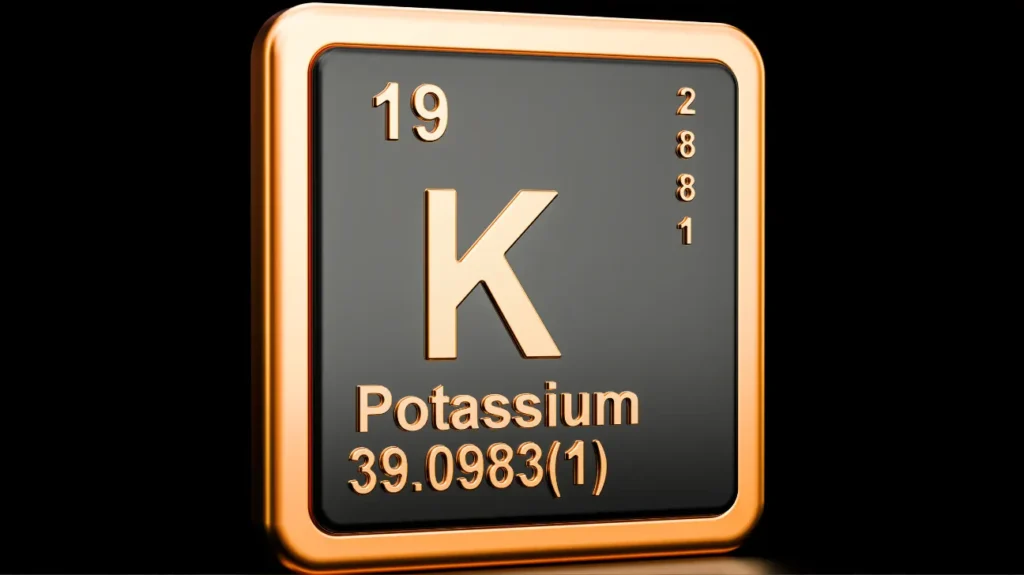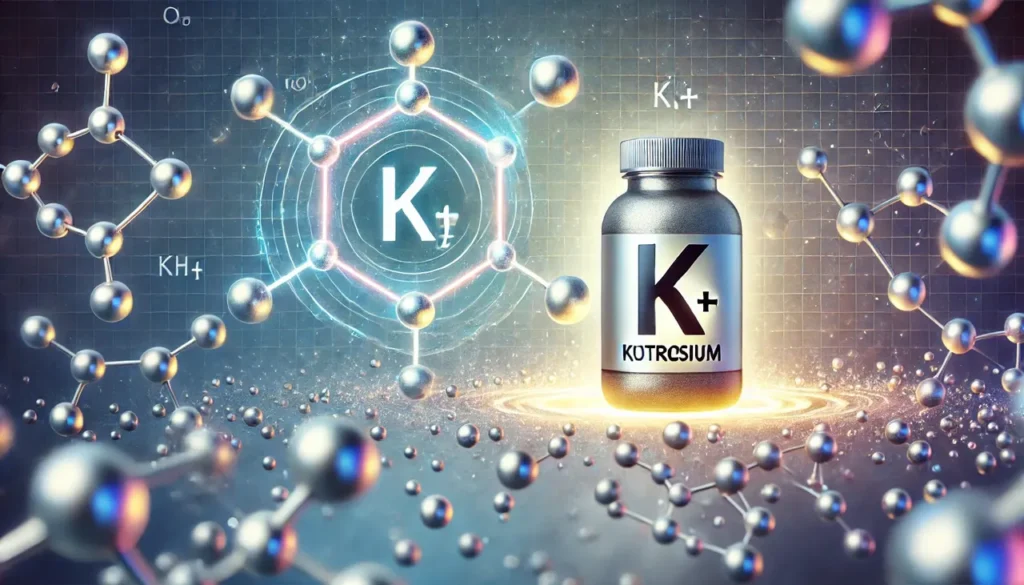Potassium is an essential mineral and electrolyte critical for numerous physiological functions in the human body. It plays a vital role in maintaining fluid balance, supporting nerve transmission, and facilitating muscle contractions, including those of the heart. Increasingly, potassium has garnered interest for its potential cognitive-enhancing effects, leading to its consideration as a nootropic supplement. This article delves into the sources, chemistry, physiological mechanisms, potential nootropic benefits, dosage guidelines, side effects, drug interactions, and safety considerations surrounding potassium supplementation.
You May Also Like:
Magnesium: Benefits, Dosage, Side Effects, Drug Interactions, And Other Important Information
Sources of Potassium
Potassium is naturally found in a variety of foods, making it relatively easy to obtain through a balanced diet. Common dietary sources of potassium include:
- Fruits: Bananas, oranges, and avocados are well-known for their high potassium content. Bananas, for example, contain about 422 mg of potassium per medium-sized fruit.
- Vegetables: Leafy greens such as spinach and kale, as well as root vegetables like sweet potatoes and potatoes, are excellent sources of potassium. A medium-sized baked potato with skin can provide approximately 926 mg of potassium.
- Legumes: Beans, lentils, and peas not only offer a good amount of potassium but are also rich in protein and fiber.
- Dairy: Milk and yogurt are significant sources of potassium, contributing to daily intake in a tasty and nutritious manner.
- Nuts and Seeds: Almonds, sunflower seeds, and pistachios contain potassium alongside healthy fats and proteins.
While many individuals can meet their potassium requirements through diet, certain conditions or dietary choices may necessitate supplementation.
Relieve Muscle Cramps and Support Mental Clarity with Potassium—Shop Today on Amazon!

Chemistry of Potassium
Potassium (K) is a soft, silvery-white metal classified as an alkali metal. It is highly reactive, particularly with water, forming potassium hydroxide (KOH) and releasing hydrogen gas. In biological systems, potassium predominantly exists in its ionic form (K⁺), which is crucial for various physiological processes. The normal serum potassium concentration in the human body ranges from 3.5 to 5.0 mmol/L, and maintaining this balance is vital for health.
Potassium ions are integral to the function of the sodium-potassium pump (Na⁺/K⁺-ATPase), a critical membrane protein that helps maintain the resting membrane potential of cells. This pump exchanges three sodium ions out of the cell for two potassium ions, creating an electrochemical gradient necessary for nerve impulse transmission and muscle contraction. Additionally, potassium is involved in enzymatic reactions that impact metabolic processes, including energy production and protein synthesis.

Physiological Mechanisms of Potassium in the Body and Brain
Beyond fluid balance and muscle contraction, potassium plays specific roles in brain health and function.
- Neurotransmission: Potassium ions are essential for generating action potentials in neurons. The influx and efflux of K⁺ during the depolarization and repolarization phases of action potentials allow for effective nerve signal transmission. Proper potassium levels help maintain neuronal excitability and prevent excessive neuronal firing, which is crucial for cognitive functions such as learning and memory.
- Cardiovascular Health: Potassium contributes to cardiovascular health by regulating heart rate and blood pressure. Studies suggest that adequate potassium intake may lower the risk of hypertension and stroke by promoting vasodilation and counteracting sodium’s effects on blood pressure. These cardiovascular benefits indirectly support cognitive function, as optimal blood flow and oxygen delivery to the brain are vital for maintaining cognitive performance.
- Muscle Function: Potassium is crucial for muscle contraction and relaxation. In the brain, this is particularly important for motor function and coordination, both of which can influence overall cognitive performance. Inadequate potassium levels can lead to muscle weakness and cramping, potentially impacting physical activity and cognitive tasks requiring fine motor skills.
Promote Energy, Muscle Recovery, and Cognitive Function with Potassium—Order Today on Amazon!

Nootropic Benefits of Potassium
While potassium is primarily recognized for its essential roles in physiology, its nootropic potential has begun to emerge in scientific discussions. The following benefits illustrate its potential cognitive-enhancing effects:
1. Enhanced Cognitive Function: Adequate potassium levels support neurotransmitter release and neuronal communication, which are vital for cognitive tasks such as problem-solving, learning, and memory recall. Research has shown that potassium supplementation may enhance cognitive performance, particularly in individuals with suboptimal potassium intake or those exposed to stressful conditions that could deplete potassium levels. Moreover, sufficient potassium intake has been linked to improved attention and processing speed, suggesting a comprehensive role in cognitive agility. By facilitating effective communication between neurons, potassium may also aid in the formation and retention of memories, making it an essential nutrient for lifelong cognitive health.
2. Mood Regulation: Potassium’s influence on neurotransmission extends to mood regulation. Low potassium levels have been associated with increased anxiety and depressive symptoms, likely due to their impact on serotonin and dopamine pathways. Supplementation may help stabilize mood and improve mental well-being, particularly in individuals with dietary deficiencies or stress-related conditions. Furthermore, research indicates that maintaining adequate potassium levels may support a more balanced emotional state by promoting healthy hormonal responses. This stabilization can be particularly beneficial during periods of heightened stress or anxiety, helping to mitigate negative emotional experiences and enhance overall resilience.
3. Stress Reduction: Potassium helps regulate the body’s response to stress by influencing the HPA axis (hypothalamic-pituitary-adrenal axis). Optimal potassium levels can help balance cortisol, the stress hormone, thereby reducing the effects of chronic stress on cognitive performance. Maintaining stable potassium levels through diet or supplementation may enhance resilience to stress and improve overall cognitive function under pressure. In addition, a diet rich in potassium can improve physical health, further contributing to stress management by enhancing overall energy levels and reducing fatigue. As a result, individuals with adequate potassium intake may experience better coping mechanisms during stressful situations, leading to improved mental clarity and focus.

Dosage and Supplementation Guidelines
The recommended daily allowance (RDA) for potassium is 2,500 mg for adult women and 3,000 mg for adult men, with slightly higher requirements for pregnant and lactating women. However, individuals with specific health conditions or dietary restrictions may require potassium supplementation to meet these needs.
- General Nootropic Dosage: For cognitive enhancement, potassium supplementation typically ranges from 100 mg to 300 mg per day. Individual requirements and dietary intake can affect the optimal dosage, so it’s essential to consider potassium sources in the diet when determining supplementation levels.
- Supplement Forms: Potassium supplements are available in various forms, including potassium chloride, potassium citrate, and potassium gluconate. These forms differ in bioavailability and absorption, with potassium citrate often preferred for its mild taste and better gastrointestinal tolerance.
- Dietary Considerations: It is essential to monitor dietary potassium intake to avoid excessive supplementation, as high potassium levels can lead to hyperkalemia (elevated potassium levels in the blood), which poses significant health risks.
Enhance Body Vitality and Brain Function with Potassium Supplements—Shop Amazon’s Best Now!

Side Effects and Safety
Potassium is generally considered safe for most individuals when consumed within recommended dosages. However, excessive intake can lead to side effects, particularly for those with certain health conditions:
- Hyperkalemia: This condition arises from excessively high potassium levels in the blood, leading to symptoms such as weakness, fatigue, palpitations, and, in severe cases, cardiac arrest. Individuals with kidney disease, heart conditions, or those taking certain medications (e.g., ACE inhibitors) may be at increased risk for hyperkalemia and should consult a healthcare provider before starting potassium supplementation.
- Gastrointestinal Disturbances: Some individuals may experience gastrointestinal side effects, including nausea, abdominal discomfort, or diarrhea, when taking potassium supplements. To minimize these effects, it is advisable to take potassium with food or use slow-release formulations.
- Allergic Reactions: Though rare, allergic reactions to potassium supplements can occur. Symptoms may include rash, itching, or swelling. Individuals with known sensitivities should seek medical advice before initiating supplementation.
Interactions with Other Supplements and Medications
Potassium can interact with several medications and dietary supplements, which may affect their efficacy or increase the risk of adverse effects:
- Diuretics: Certain diuretics, especially potassium-sparing diuretics, can increase potassium levels in the body. Individuals taking these medications should monitor their potassium intake to avoid hyperkalemia.
- ACE Inhibitors and ARBs: Medications that inhibit the renin-angiotensin-aldosterone system (RAAS), such as ACE inhibitors and angiotensin receptor blockers (ARBs), may elevate potassium levels. Patients on these medications should regularly check their potassium levels and consult healthcare professionals regarding supplementation.
- Nonsteroidal Anti-Inflammatory Drugs (NSAIDs): Chronic use of NSAIDs may impair renal function, affecting potassium excretion and potentially leading to elevated potassium levels in susceptible individuals.
- Other Supplements: Potassium may interact with magnesium and calcium supplements. Since these minerals often work synergistically, maintaining a balanced intake is essential for optimal health.
Risks for Individuals with Certain Health Conditions
Certain health conditions warrant caution when using potassium supplements:
- Kidney Disease: Individuals with impaired kidney function are at high risk for hyperkalemia, as their kidneys may not efficiently excrete excess potassium. Monitoring by healthcare professionals is critical for this population.
- Heart Disease: Patients with heart conditions must be cautious with potassium supplementation, as elevated potassium levels can exacerbate arrhythmias or other cardiac issues.
- Diabetes: Individuals with diabetes who are on medications affecting renal function should also be cautious about potassium intake. Regular monitoring of electrolyte levels is essential to prevent complications.
Relieve Fatigue and Sharpen Your Mind with Potassium’s Powerful Benefits—Order Today on Amazon!

Conclusion: Should You Consider Potassium as a Nootropic?
Potassium’s vital roles in neurotransmission, mood regulation, and cardiovascular health suggest that adequate intake is essential for cognitive function and overall well-being. As a potential nootropic, potassium may enhance cognitive performance, particularly in individuals experiencing deficiencies or stress-related conditions. However, while potassium supplementation can provide benefits, it is crucial to adhere to recommended dosages and monitor for interactions with medications and other supplements.
Consulting with a healthcare professional before beginning potassium supplementation is advisable, especially for individuals with pre-existing health conditions or those taking medications that may interact with potassium levels. By ensuring sufficient potassium intake through diet or responsible supplementation, individuals can optimize their cognitive health and enhance their overall quality of life.
In summary, potassium is a fundamental mineral that supports various physiological functions, including cognitive processes. Maintaining adequate potassium levels is essential for mental clarity, mood stabilization, and stress resilience, all of which contribute to an improved cognitive experience.

References:
- The increased potassium intake improves cognitive performance and attenuates histopathological markers in a model of Alzheimer’s disease. Retrieved from: https://www.sciencedirect.com/science/article/pii/S0925443915002811
- Everything you need to know about potassium. Retrieved from: https://www.medicalnewstoday.com/articles/287212
- Increasing potassium intake to reduce blood pressure and risk of cardiovascular diseases in adults. Retrieved from: https://www.who.int/tools/elena/interventions/potassium-cvd-adults
- Potassium Fact Sheet for Health Professionals. Retrieved from: https://ods.od.nih.gov/factsheets/Potassium-HealthProfessional/
- The Power of Potassium: Why You Need This Essential Mineral. Retrieved from: https://health.clevelandclinic.org/potassium
Important Note: The information contained in this article is for general informational purposes only, and should not be construed as health or medical advice, nor is it intended to diagnose, prevent, treat, or cure any disease or health condition. Before embarking on any diet, fitness regimen, or program of nutritional supplementation, it is advisable to consult your healthcare professional in order to determine its safety and probable efficacy in terms of your individual state of health.
Regarding Nutritional Supplements Or Other Non-Prescription Health Products: If any nutritional supplements or other non-prescription health products are mentioned in the foregoing article, any claims or statements made about them have not been evaluated by the U.S. Food and Drug Administration, and such nutritional supplements or other health products are not intended to diagnose, treat, cure, or prevent any disease.


